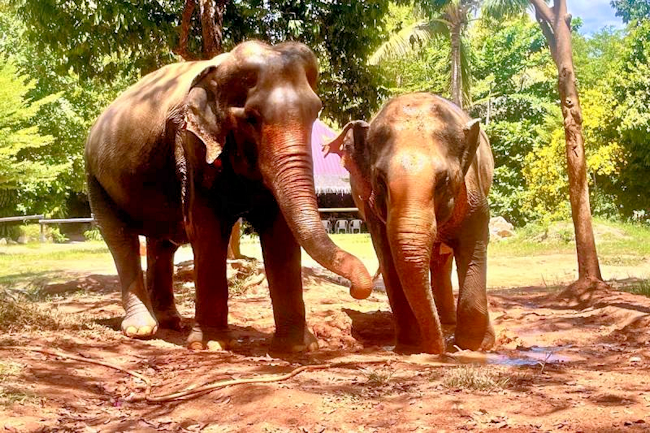The Samui Elephant Sanctuary is home to seven female Asian elephants.
2 of these elephants are over 60 years old.
These elephants were rescued when they could no longer work in the logging or tourism industries.
Rescued elephants have been broken and abused their entire lives.
In the lush grounds of Bo Phut in the heart of Koh Samui, a tourist island in southern Thailand, the elephant sanctuary is set in a forest among bougainvillea, birds and butterflies.
Years before arriving at the sanctuary in 2018 – the year it opened – the elephants did gruelling work in the logging industry. That was until 1989, when Thailand banned trade in timber to protect its forests.
The move left many of the country’s working elephants unemployed, and led the mahouts who handled them to seek work in the tourism sector.
The elephant named Kham Phean subsequently spent 30 years in Pattaya, a tourist town on the Gulf of Thailand about 150 kilometers southeast of Bangkok. When she was not being ridden by tourists, she was chained to a tree.
The elephant named Kaew Ta, who is blind in one eye after being struck by her mahout with a sharp object for disobeying a command, also spent years carrying tourists in the heat. She, too, was chained the rest of the time.
A harsh life spent working in logging and tourism is the common thread connecting the animals at the sanctuary in Bo Phut – and the seven other rescued elephants at its second branch in Chaweng Noi, also on Koh Samui.
Large scars on their foreheads, where the elephants were beaten with metal hooks, tell stories of misery and are permanent reminders of lives shaped by abuse and suffering.
Asian elephants are listed as an endangered species on the International Union for Conservation of Nature’s (IUCN) Red List – one of the world’s most comprehensive data sources on the conservation status of animal, fungi and plant species.
Thailand is home to about 15% of the 52,000 wild Asian elephants. The mammals roam free in 12 other countries, including Bangladesh, Bhutan, Cambodia and China.
According to 2021 research by non-profit organisation World Animal Protection (WAP), Thailand has 4,000 elephants in captivity.
Many end up exploited in Thailand’s massive tourism industry: 35.5 million people visited the country in 2024, generating more than 1.8 trillion baht in tourism revenue, according to the Tourism Authority of Thailand.
Elephants have become a valuable commodity in the Thai tourism sector, but many operators see them as objects from which to profit, sparing no thought for their well-being.
Tourists seeking the “once-in-a-lifetime” experience of riding elephants equates to a lifetime of misery for the animals.
For an elephant to be compliant enough to be ridden by humans, it must first fear them. This is achieved by breaking their spirit in a process known as a “crush”.
To break elephants down psychologically, calves are taken away from their mothers, chained, starved and beaten into submission.
At the Samui Elephant Sanctuary, which is recognized by WAP as a “best practice elephant venue”, the animals are free from chains and exploitation. It is more like a retirement home.
They roam freely and engage in natural behaviors.
“We are letting the elephants simply be elephants,” adding that Kaew Ta and Kham Phean have formed a strong bond. “They will cry out if they lose sight of each other.”
Allowing tourists to bathe with elephants is banned here because the practice disrupts the animals’ natural socializing behaviors and also stresses them.
“Elephants love to socialise and bathe, either on their own or with other elephants,” adding that elephants are highly intelligent and social animals.
“To do this, they need space to splash, roll around, submerge themselves in the water and coat their bodies in lovely thick mud.
“If people are in the water crowding around the elephants, it is very stressful for them and also stops their natural behavior.”
Bathing with elephants is also dangerous, he adds. In 2022, a 22-year-old Spanish tourist died during an elephant bathing activity in Thailand’s Phang Nga province.
“It is important to protect the elephants from cruel practices … much of the inspiration here at our sanctuary comes from Lek.”
Lek is the nickname of Saengduean Chailert, the founder of the Save Elephant Foundation and the Elephant Nature Park in Chiang Mai, who is something of a national hero when it comes to elephant conservation. The Samui Elephant Sanctuary and others operate in line with her guidelines.
Lek’s mission is to raise awareness of the plight of the Asian elephant while supporting ecotourism initiatives. Her work was the focus of the critically acclaimed 2018 documentary Love & Bananas: An Elephant Story.
Lek’s advocacy has triggered a global shift by encouraging traditional elephant camps to embrace a “saddle off” model where elephants are neither ridden nor exploited.
Her work is part of global efforts to promote ethical tourism so that acts involving animal cruelty such as elephant riding, tiger petting, monkey performances and whale and dolphin shows are left off travelers’ itineraries.
WAP estimates that 5.5 billion animals from 487 different species are being kept in inhumane conditions worldwide, particularly bears, elephants and lions.
According to the report, a large number of Thai elephants in captivity are said to suffer from post-traumatic stress disorder and other psychological conditions.
Source: The Bangkok Post



